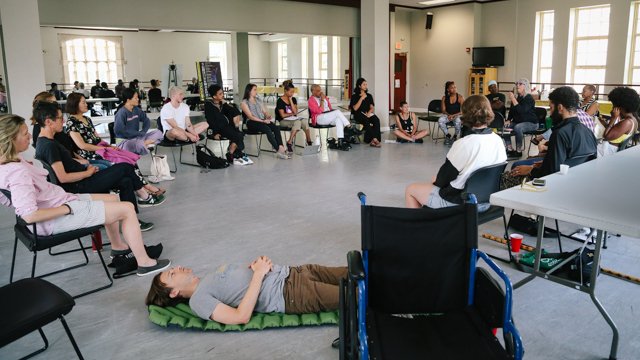
upcoming +
past events

MANCC Showing
Emily Hansel and Rebecca Fitton are beginning a new collaboration and will be in residency at MANCC this August (what an honor!!!). If you happen to be in Tallahassee, come spend some time with us on August 24.

Theater Takeover Workshop
FREE WORKSHOP for kids ages 5-12! Come at 2:00pm to get a special theater tour from Emily, meet the performers, learn about the different elements of the theater, dance on the stage, and even try out some choreography from the show! If you’d like, stick around for the 3:00pm performance of Study Hall.

Study Hall
Study Hall, inspired by a series of public conversations on cultivating equitable workplaces, is performed by four dancer-choreographers who share an interest in forging new models for safety, equity, and sustainability in our contemporary dance field. In its final form, Study Hall can accurately be described as both carefully crafted and highly unplanned. Treading the line between set choreography and improvisational score, Study Hall exemplifies both the world building and dismantling that the artists crave.

Work-in-Progress Showing
Witness excerpts of EHC’s newest work, Study Hall, and provide feedback in a curated context.

Adv. Contemporary classes
Driven by Emily's movement philosophy of doing less to do more, this class will be a practice in executing movement defined by task, imagery, and somatic insight. We'll begin with some coordinated wiggling, improvising, and light phrase work that progressively builds in size, effort, and complexity as we get warm. Instead of culminating with a big combo, we will learn numerous, bite-sized sequences of movement (upright, floorwork, and everything in between) and practice them in repetition traveling across the floor. The class will be influenced by a diverse range of contemporary techniques that have fueled Emily's own dancing. Modification, adaptation, and individuality will be actively addressed and encouraged.

Ideas for Resource Sharing
Topic #6 in the Community Study Hall series
IDEAS FOR RESOURCE SHARING
How to amplify the resources we have to support more people
Collectively working as an ecosystem to share resources like space, time, money, and knowledge
Planning and coordinating to minimize conflicts and competition in the project-based, freelance dance community
Naming obstacles to resource sharing
Bring your own ideas!

HOW CAN WE HOLD DECISION-MAKERS ACCOUNTABLE?
Topic #5 in the Community Study Hall series:
HOW CAN WE HOLD DECISION-MAKERS ACCOUNTABLE?
Fostering healthy and constructive conversations about accountability with people in leadership positions
How do we communicate when things aren’t working (for either dancer or director)?
How to respectfully say no, and be prepared to hear someone else say no to you.
Conversations across power dynamics (artist, collaborators, directors, funders, presenters, etc.)
Building in checks to power, asking for and providing sincere feedback
Ways to articulate inclusivity without being or feeling performative
Concrete examples from our experiences where a leader has changed their practices toward equity and safety

BUILDING BUDGETS THAT PRIORITIZE DANCER PAY
Topic #4 in the Community Study Hall series:
BUILDING BUDGETS THAT PRIORITIZE DANCER PAY
Making sure our budget aligns with our values and tells a story we can be proud of
Different pay rates for different artists/roles in a production
What’s an appropriate base rate/minimum wage/living wage for dancers? Other benefits for dancers?
How can a budget be geared toward sustainability?
Compensation for choreographers/directors

Wonk
A new work choreographed by Emily Hansel, presented as part of iMPACt’s annual holiday festival, The Nutshell.

OWNERSHIP AND CREDIT IN COLLABORATIVE PROCESSES
Topic #3 in the Community Study Hall series:
OWNERSHIP AND CREDIT IN COLLABORATIVE PROCESSES
Holding a thoughtful container for dancer-generated movement
How does it feel when you’re asked to generate material in different contexts?
How can we manage expectations and form sincere and clear agreements around collaboration, ownership, and credit?
Examples from our experiences where we felt good about the way credit and ownership were being handled

THE EMOTIONAL LABOR OF WRITING ABOUT OUR WORK
Topic #2 in the Community Study Hall series:
THE EMOTIONAL LABOR OF WRITING ABOUT OUR WORK
What emotions does grant writing bring up for you?
How do you feel about communicating about your dance work via the medium of spoken or written language?
How do you talk about yourself and your work in person vs. on social media vs. for grant applications?
Feelings about representing ourselves differently in different contexts

DREAMING UP A DANCER’S UTOPIA
Topic #1 in the Community Study Hall series:
DREAMING UP A DANCER’S UTOPIA
Dancers, what do you need and want in a dance job or process?
What tangible things can make our field more sustainable?
What things make you feel more supported and safe?
Let’s leave behind our scarcity mindset and dream big to generate a list of concrete desires.

Community Meeting
EHC recently got funding from the SF Arts Commission (woohoo!) to host a workshop series that will bring dancers and choreographers/directors together in discussion about cultivating healthy, equitable workplaces in our contemporary dance field. We will spend this community meeting collectively choosing discussion topics for the rest of the workshop series, utilizing a version of adrienne maree brown’s method for Emergent/Collective Agenda Development.

Int./Adv. Contemporary Classes
Driven by Emily's movement philosophy of doing less to do more, this class will be a practice in executing movement defined by task, imagery, and somatic insight. We'll begin with some coordinated wiggling, improvising, and light phrase work that progressively builds in size, effort, and complexity as we get warm. Instead of culminating with a big combo, we will learn numerous, bite-sized sequences of movement (upright, floorwork, and everything in between) and practice them in repetition traveling across the floor. The class will be influenced by a diverse range of contemporary techniques that have fueled Emily's own dancing. Modification, adaptation, and individuality will be actively addressed and encouraged.

Bad Birdwatching
Bad Birdwatching, a duet choreographed and performed by Mia J. Chong and Emily Hansel, is a stroll through the forest that playfully addresses how humans unknowingly alter the natural world. Through mundane rituals and gibberish vignettes, we explore the day-to-day guilt, or lack thereof, regarding the climate crisis and other social inequities.

Bad Birdwatching at Elad’s Salon
Bad Birdwatching, a duet choreographed and performed by Mia J. Chong and Emily Hansel, is a stroll through the forest that playfully addresses how humans unknowingly alter the natural world. Through mundane rituals and gibberish vignettes, we explore the day-to-day guilt, or lack thereof, regarding the climate crisis and other social inequities.

Bad Birdwatching at BAMPFA
Bad Birdwatching, a duet choreographed by Mia J. Chong and Emily Hansel and performed by Jaime Garcia and Ben Warner, is a stroll through the forest that playfully addresses how humans unknowingly alter the natural world. Through mundane rituals and gibberish vignettes, we explore the day-to-day guilt, or lack thereof, regarding the climate crisis and other social inequities.

Knock
Join us at the YBCA Forum for a new work choreographed by Emily Hansel in collaboration with dancers Crystaldawn Bell, Mia J. Chong, Colin Frederick, Caitlin Hicks, Moscelyne ParkeHarrison, Anthony Pucci, and Benjamin Warner. The piece features music composed by Joan Jeanrenaud performed by musicians from the San Francisco Conservatory of Music, with lighting design by David Robertson and Thomas Bowersox, and costume design by Aine Dorman. “Knock” is presented as part of a Post:ballet ‘s + Kronos Quartet collaboration entitled, still be here.

dancers’ rights workshop for college dancers
Join us in conversation about dancer working conditions and learn about the importance of collective action in our field. Designed for current dance majors and led by professional dancers and artist advocates.